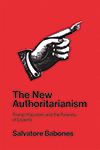Book review: populist backlash could be good for democracy
Book review: The New Authoritarianism The populist backlash against the role of experts in the political process isn't such a bad thing, says Professor Salvatore Babones.

Get the latest financial news, insights and expert analysis from our award-winning MoneyWeek team, to help you understand what really matters when it comes to your finances.
You are now subscribed
Your newsletter sign-up was successful
Want to add more newsletters?

Twice daily
MoneyWeek
Get the latest financial news, insights and expert analysis from our award-winning MoneyWeek team, to help you understand what really matters when it comes to your finances.

Four times a week
Look After My Bills
Sign up to our free money-saving newsletter, filled with the latest news and expert advice to help you find the best tips and deals for managing your bills. Start saving today!

Trump, Populism and theTyranny of Experts
Polity Press (£9.99)
MoneyWeek
Subscribe to MoneyWeek today and get your first six magazine issues absolutely FREE

Sign up to Money Morning
Don't miss the latest investment and personal finances news, market analysis, plus money-saving tips with our free twice-daily newsletter
Don't miss the latest investment and personal finances news, market analysis, plus money-saving tips with our free twice-daily newsletter
The past few years have seen a populist backlash against the role of experts in the political process. Some view this as a return to the dark ages. Professor Salvatore Babones, of the University of Sydney, argues it isn't so bad. The backlash may even be healthy for democracy.
Large swathes of public life have been taken out of the hands of elected governments and given over to unelected technocrats. These technocrats accuse their populist opponents of being closet authoritarians, yet, as Babones argues, their own support for democracy is conditional on the public endorsing their preferred outcomes. When the public doesn't respond appropriately, by voting for the "wrong" policy or candidate, they either refuse to accept the outcome or use every means possible to undermine it. European governments pressed on with European integration, for example, despite the results of referendums in France, the Netherlands and Ireland.
This is not to endorse individual populist politicians, nor to dismiss liberalism. It's just that liberalism's dominance has been bad for it, because it has moved it from its traditional role of exerting a moderating influence on the excesses of both right and left. Babones's criticisms of the status quo may strike some as overwrought, but his monograph is an original and provocative contribution to the debate.
Get the latest financial news, insights and expert analysis from our award-winning MoneyWeek team, to help you understand what really matters when it comes to your finances.

-
 Should you buy an active ETF?
Should you buy an active ETF?ETFs are often mischaracterised as passive products, but they can be a convenient way to add active management to your portfolio
-
 Power up your pension before 5 April – easy ways to save before the tax year end
Power up your pension before 5 April – easy ways to save before the tax year endWith the end of the tax year looming, pension savers currently have a window to review and maximise what’s going into their retirement funds – we look at how